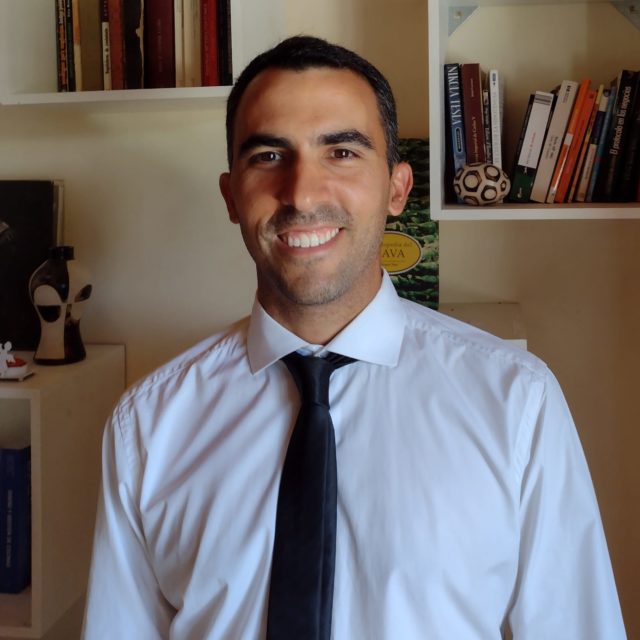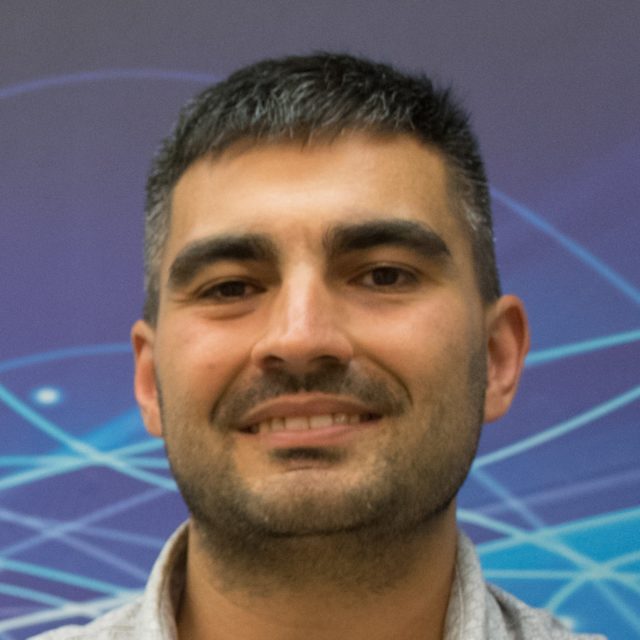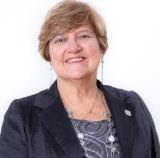COMPUTATIONAL INTELLIGENCE
TECHNICAL PROGRAM COMMITTEE
| Chair | Co-Chair | Co-Chair |

Dr. Daniela Lopéz De Luisemdldl.ci2s@gmail.com
Dr. Daniela Lopéz De LuiseDaniela López De Luise has a degree in Systems Analysis from the Faculty of Engineering of the University of Buenos Aires (1989), then continued her training in the intelligent systems sector obtaining the title of Specialist in Expert Systems Engineering from the Technological Institute of Buenos Aires (2000). In 2008 she received the title of Doctor in Computer Science from the National University of La Plata. She finally acquires the title of Public Communicator of Science and Technology granted jointly by the Faculty of Exact Sciences, Sociology and Philosophy and Letters of the University of Buenos Aires (2022).
His professional career begins in intelligent systems, and expands to other related topics, having collaborated for large national and international firms. He gradually incorporates scientific and academic activities, leading the Computational Intelligence & Information Systems Labs (since 2013) and the IDTI Lab of the Faculty of Science and Technology at the Autonomous University of Entre Rios. She also participates as a teacher and researcher in various educational entities. She is currently the academic coordinator of the Center for Studies in Intelligent Technologies of the National Academy of Sciences of Buenos Aires. She has been founder and steering committee of several networks and laboratories. She founded, was the first president and currently continues to belong to the staff of the IEEE Computational Intelligence Society of Argentina (IEEE’s first world chapter on these issues), was president of IEEE Argentina, founder and managing partner of Enterpriseware S.R.L., founder and leader of IEEE Women in Computational Intelligence, and actively belongs to the Matilda Latin American Chair for Women in Science. She has several national and international awards to her credit, including the SADOSDY award and the IEEE R9 Latin American Eminent Engineer award. She currently coordinates the IEEE Games Technical Committee in Argentina, and the Video Game Development and Production Network (Latin American international consortium). He also chairs some diploma courses and coordinates projects related to linguistic reasoning, chatterbots, and Morphosyntactic Wavelets. His personal research work focuses on the formalization of a thermodynamics that regulates languages. He performs consulting tasks for several national and international companies. His base research area is the automatic generation of language and its mathematical relationship with natural speech. |

Darío Príncipiprincipidario@gmail.com
Darío Pérez PrincipiDarío Pérez Principi, an electronics engineer by the University of Buenos Aires. He has a master’s degree in Artificial Intelligence from the Polytechnic University of Catalonia, the University of Barcelona and the Rovira i Virgili University. He works as a researcher in the area of affective computing at the University of Palermo in collaboration with the Computer Vision Center located in Barcelona. He teaches the subject Computer Vision Project at the University of Palermo. He founded the company Artificial Inventive a few years ago, dedicated to providing solutions based on Artificial Intelligence for different industries.
|

Dr. Guillermo Rodríguezexarodriguez@gmail.com
1) Guillermo RodríguezGuillermo Rodríguez is Director of the Degree in Artificial Intelligence at the University of Palermo, a member of the Tandil Software Engineering Institute, Argentina, Associate Researcher at CONICET and Associate Professor at UNCPBA. He graduated as a Systems Engineer in 2010 (UNCPBA), and a Doctor of Computer Science in 2014 (UNCPBA). His main research areas are microservices oriented software development, case-based reasoning and machine learning.
|
DISTINGUISHED SPEAKERS

PhD. James M. KellerJames M. Keller received the Ph.D. in Mathematics in 1978. He is now the Curators’ Distinguished Professor Emeritus in the Electrical Engineering and Computer Science Department at the University of Missouri. Jim is an Honorary Professor at the University of Nottingham. His research interests center on computational intelligence: fuzzy set theory and fuzzy logic, neural networks, and evolutionary computation with a focus on problems in computer vision, pattern recognition, and information fusion including bioinformatics, spatial reasoning in robotics, geospatial intelligence, sensor and information analysis in technology for eldercare, and landmine detection. His industrial and government funding sources include the Electronics and Space Corporation, Union Electric, Geo-Centers, National Science Foundation, the Administration on Aging, The National Institutes of Health, NASA/JSC, the Air Force Office of Scientific Research, the Army Research Office, the Office of Naval Research, the National Geospatial Intelligence Agency, the U.S. Army Engineer Research and Development Center, the Leonard Wood Institute, and the Army Night Vision and Electronic Sensors Directorate. Professor Keller has coauthored over 500 technical publications. |

PhD. Santiago SegarraSantiago Segarra received the B.Sc. degree in Industrial Engineering with highest honors (Valedictorian) from the Instituto Tecnológico de Buenos Aires (ITBA), Argentina, in 2011, the M.Sc. in Electrical Engineering from the University of Pennsylvania (Penn), Philadelphia, in 2014 and the Ph.D. degree in Electrical and Systems Engineering from Penn in 2016. From September 2016 to June 2018 he was a postdoctoral research associate with the Institute for Data, Systems, and Society at the Massachusetts Institute of Technology. Since July 2018, Dr. Segarra is a W. M. Rice Trustee Assistant Professor in the Department of Electrical and Computer Engineering at Rice University. His research interests include network theory, data analysis, machine learning, and graph signal processing. Dr. Segarra received the ITBA’s 2011 Best Undergraduate Thesis Award in Industrial Engineering, the 2011 Outstanding Graduate Award granted by the National Academy of Engineering of Argentina, the 2017 Penn’s Joseph and Rosaline Wolf Award for Best Doctoral Dissertation in Electrical and Systems Engineering, the 2020 IEEE Signal Processing Society Young Author Best Paper Award, the 2021 Rice’s School of Engineering Research + Teaching Excellence Award, and five best conference paper awards. |

Dr. Daniela Lopéz De Luisemdldl.ci2s@gmail.com
Dr. Daniela Lopéz De LuiseDaniela López De Luise has a degree in Systems Analysis from the Faculty of Engineering of the University of Buenos Aires (1989), then continued her training in the intelligent systems sector obtaining the title of Specialist in Expert Systems Engineering from the Technological Institute of Buenos Aires (2000). In 2008 she received the title of Doctor in Computer Science from the National University of La Plata. She finally acquires the title of Public Communicator of Science and Technology granted jointly by the Faculty of Exact Sciences, Sociology and Philosophy and Letters of the University of Buenos Aires (2022).
His professional career begins in intelligent systems, and expands to other related topics, having collaborated for large national and international firms. He gradually incorporates scientific and academic activities, leading the Computational Intelligence & Information Systems Labs (since 2013) and the IDTI Lab of the Faculty of Science and Technology at the Autonomous University of Entre Rios. She also participates as a teacher and researcher in various educational entities. She is currently the academic coordinator of the Center for Studies in Intelligent Technologies of the National Academy of Sciences of Buenos Aires. She has been founder and steering committee of several networks and laboratories. She founded, was the first president and currently continues to belong to the staff of the IEEE Computational Intelligence Society of Argentina (IEEE’s first world chapter on these issues), was president of IEEE Argentina, founder and managing partner of Enterpriseware S.R.L., founder and leader of IEEE Women in Computational Intelligence, and actively belongs to the Matilda Latin American Chair for Women in Science. She has several national and international awards to her credit, including the SADOSDY award and the IEEE R9 Latin American Eminent Engineer award. She currently coordinates the IEEE Games Technical Committee in Argentina, and the Video Game Development and Production Network (Latin American international consortium). He also chairs some diploma courses and coordinates projects related to linguistic reasoning, chatterbots, and Morphosyntactic Wavelets. His personal research work focuses on the formalization of a thermodynamics that regulates languages. He performs consulting tasks for several national and international companies. His base research area is the automatic generation of language and its mathematical relationship with natural speech. |

PhD. Ricardo SanfeliceRicardo G. Sanfelice is Professor of Electrical and Computer Engineering, University of California at Santa Cruz, CA, USA. He received his M.S. and Ph.D. degrees in 2004 and 2007, respectively, from the University of California, Santa Barbara. During 2007 and 2008, he was a Postdoctoral Associate at the Laboratory for Information and Decision Systems at the Massachusetts Institute of Technology and visited the Centre Automatique et Systemes at the Ecole de Mines de Paris for four months. Prof. Sanfelice is the recipient of the 2013 SIAM Control and Systems Theory Prize, the National Science Foundation CAREER award, the Air Force Young Investigator Research Award, the 2010 IEEE Control Systems Magazine Outstanding Paper Award, the 2012 STAR Higher Education Award for his contributions to STEM education, and the 2020 ACM Test-of-Time Award from the HSCC. He is Associate Editor for Automatica, a Fellow of the IEEE, and has served as Chair of the Hybrid Systems Technical Committee from the IEEE Control Systems Society. He is Director of the Cyber-Physical Systems Research Center at UCSC and Director of the Center for Information Technology Research in the Interest of Society and the Banatao Institute (CITRIS) Aviation Initiative. His research interests are in modeling, stability, robust control, observer design, and simulation of nonlinear and hybrid systems with applications to robotics, power systems, aerospace, and biology. |
DESCRIPTION
Computational Intelligence (CI) is the theory, design, application and development of computational paradigms that are biologically and linguistically motivated. Traditionally, the three main pillars of IC have been neural networks, diffuse systems, and evolutionary computing. However, over time many computer paradigms inspired by nature have evolved. Therefore, IC is an evolving field, and today, in addition to the three main components, it encompasses computer paradigms such as environmental intelligence, artificial life, cultural learning, artificial endocrine networks, social reasoning and social networks artificial hormones.
CI plays an important role in the development of successful intelligent systems, including games and cognitive development systems. In recent years there has been an explosion in the deep learning research field, particularly deep convolutional neural networks. Today, deep learning has become the central method for artificial intelligence. In fact, some of the most successful Artificial Intelligence systems are based on Computational Intelligence.
| SUGGESTED SUBTOPICS |
| For this topic, the following subtopics are suggested. Please note that you may send your paper beyond the scope of this list. To submit the paper follow the instructions Tutorial for Paper Submissions. |
- Genetic Algorithms
- Extreme Learning
- Deep Learning
- Swarm Intelligence
- Natural Language Processing
- Neural and Learning Systems
- Computer Vision
PANEL – WOMEN IN SCIENCE: A PERSPECTIVE FROM INTELLIGENT SYSTEMS
The panel explores the professional themes of three women who work in the field of computational intelligence: video games, STEAM education, and the evolution of AI. It then studies the circumstances and conditions of professional development and exercise in gender conditions.
- Panelist 1: Liliana Rathmann
Presentation Title: Evolution of AI and the female perspective of Matilda’s CAL - Panelist 2: Micaela Sayal
Presentation Title: “Role games: a playful tool for STEAM and life” (on behalf of IEEE GTC Argentina) - Panelist 3: Marisabel Rodríguez Bilardo
Presentation Title: What is empathy? (representing the Broadcast Technology Society Inclusion and Diversity Committee)

Liliana RathmannGraduated as a Scientific Calculator at the National University of La Plata. She was dean of the Faculty of Engineering of the Universidad Atlántida Argentina, she is Secretary General of the Latin American Open Chair of Matilda and women in Engineering, member of the Council of Informatics Sciences Professionals of the Province of Buenos Aires. Collaborates in the MECEK Laboratory of the National University of Misiones, Member of the Editorial Committee of the books “Matilda and Women in Engineering in Latin America II, III and IV”, Member of the Computer Engineering Network / Information Systems of CONFEDI – (RIISIC). |

Lic. Micaela SayalMicaela Ailén Sayal is a visual arts teacher specialized in engraving and printed art, she has experience as an art therapist, founder of West Dragons, a playful group that takes role-playing games and their learning to the whole country, as well as a member of the GTC and IEEE, as well as a feminist activist. |

Marisabel RodriguezMarisabel Rodriguez is Electronics Engineer and IEEE Senior Member. She worked in Data Centers´ infrastructure for more than 20 years and in television systems for 10 years. She is a specialist on The Cloud. Nowadays, she is a member of the AdCom of Broadcast Technology Society and she is a representative at the Committee of Inclusion and Diversity. |
ACCEPTED ARTICLES
ID |
Title |
Author |
| 377 | Sistema inteligente para la detección de fallas basado en redes profundas auto-ajustables | Ivo Perez Colo, Carolina Saavedra Sueldo, Mariano De Paula, Geraldina Roark, Sebastian Villar and Gerardo Acosta |
| 715 | Classifier design for labeling handwritten digits generated by GANs | Ornella Pitiddu and Ricardo Veiga |
| 990 | Intelligent policy determination in Petri Nets | Luis Orlando Ventre, Orlando Micolini, Julian Nicolas Altuna and Alejandro Arce Giacobbe |
| 1214 | Combination of evolutionary algorithms and orthogonal polynomials for the control vector parametrizacition. Application to biogas production | Marianela Cecilia Noriega, María Eugenia Gutierrez, María Nadia Pantano, María Cecilia Fernandez, Leandro Rodriguez and Gustavo Scaglia |
| 1736 | Machine Learning Approach for Predictive Maintenance in Hydroelectric Power Plants | Victor Velasquez and Wilfredo Flores |
| 2246 | Cross-domain Sentiment Classification in Spanish | Lautaro Estienne, Matías Vera and Leonardo Rey Vega |
| 2257 | A Modified Multi-Swarm Optimization for Weights and Biases of a Multi-Layer Perceptron for Medical Data Classification | Matias Gabriel Rojas, Jessica Andrea Carballido, Ana Carolina Olivera and Pablo Javier Vidal |
| 2587 | Structured representation of organic compounds based on autoencoders | Ignacio Pérez Correa, Pablo Giunta, Javier Francesconi and Fernando Mariño |
| 3056 | A FEM/AI Strategy for Thermal Characterization of an Epoxy Nanocomposite via a Laser-based Nondestructive Testing Experiment | Fernando Otero, Facundo Altuna and Carlos Chiuro |
| 4848 | Evaluating a Web Tool for Smart Optimization of JavaScript Files | Lucas Gil, Juan Rodriguez, Hernan Vazquez, Claudia Marcos, Santiago Vidal and Guillermo Rodriguez |
| 6100 | Moving in a Simulated Environment Through Deep Reinforcement Learning | Javier Esarte, Pablo Daniel Folino and Juan Carlos Gómez |
| 7472 | A Mining approach for Automatic Processing of Regulatory Document | Daniela López De Luise, Andrés Pascal, Claudia Alvarez and Esteban Vales |
| 7972 | Interpretation and visualization of texture-features using Convolutional Neural Networks | Diego Sebastián Comas, Agustín Amalfitano, Gustavo Javier Meschino and Virginia Laura Ballarin |
| 8229 | Baseline for the Incorporation of Electric Cabs in the Central District in Honduras | Jose Franco and Wilfredo Flores |
| 8570 | Using Siamese Networks for Advertisements Classification | Franco Raineri, Guillermo Rodriguez, Claudia Marcos, Santiago Vidal, Facundo Zabala and Martin Caraoghlanian |
| 8917 | Clasificación automática de publicaciones de productos en sitio de comercio electrónico | Sebastian Vallejos, Marcelo Armentano, Luis Berdun, Silvia Schaffino, Sandra Gonzalez Cisaro, Hector Oscar Nigro, Leonardo Balduzzi and Ignacio Cuesta |
| 9560 | Optimización Dinámica del Proceso de Fermentación para la Producción de Xilitol | Maria Eugenia Gutiérrez, Marianela Noriega, Cecilia Fernández, Nadia Pantano, Leandro Rodriguez and Gustavo Scaglia |
